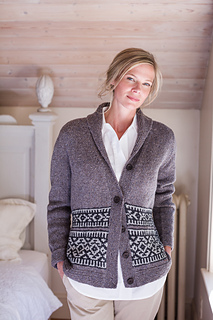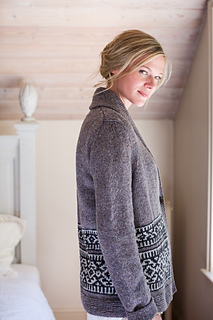patterns > Brooklyn Tweed >  Brooklyn Tweed: Fall 2015 and 1 more...
Brooklyn Tweed: Fall 2015 and 1 more...
> Nehalem








Nehalem
Save $1 when you purchase this pattern on BrooklynTweed.com, where you’ll find our knitting resource pages, video tutorials, and pattern support portal. All patterns purchased on our website can be added to your Ravelry library. Join our crafting community: sign up for our newsletter for the latest in Brooklyn Tweed yarns and patterns, knitting tips, subscriber exclusives, and even more woolly goodness!
Inspired by the beautiful sweaters designed by the Cowichan knitters of Vancouver Island, Nehalem is a shawl-collared Shelter cardigan with bands of geometric colorwork adorning the lower torso. Gentle A-line shaping allows for comfortable layering over fall outfits and the garter-stitch shawl collar, shaped with short rows, folds snugly about the neck. Nehalem is worked with a steek at the center front so you can knit the colorwork in the round. Sleeves are also worked in the round to the underarm; the caps are knit flat and set in. The quiet, monochrome palette we chose nods to the natural sheep shades that characterize Cowichan colorwork, but feel free to knit up a blaze of autumn glory with our red and orange hues.
Construction
The body is worked circularly from the lower edge to the underarms, with stitches for a steek at the center front. The steek stitches are bound off while binding off the underarm stitches and separating the upper fronts and back, which are then worked flat to the shoulder. The sleeves are worked circularly to the underarm, then the cap is worked flat. The center front steek is secured and then cut open before picking up stitches for the collar/band piece. After the collar/band is worked, the steek is neatly tacked to the WS of the garment, either with yarn or sewing thread.
Yardage
Worsted weight wool yarn in the following approximate amounts:
920 (1005, 1140, 1250, 1370, 1520) yards of Color 1 (C1)
125 (135, 150, 160, 175, 190) yards of Color 2 (C2)
115 (125, 135, 150, 160, 175) yards of Color 3 (C3)
Yarn
Brooklyn Tweed Shelter (100% American Targhee-Columbia wool; 140 yards/50g)
7 (8, 9, 9, 10, 11) skeins of C1
1 (1, 2, 2, 2, 2) skein(s) of C2
1 (1, 1, 2, 2, 2) skein(s) of C3
Photographed in colors Stormcloud (C1), Cast Iron (C2), and Snowbound (C3)
Gauge
18 stitches & 28 rounds = 4” in single-color stockinette stitch with Size A needle(s), after blocking
18 stitches & 22 rounds = 4” in charted colorwork pattern with Size B needle(s), after blocking
Needles
Size A (for Main Fabric)
One 32″ or 40” circular needle and one set of double-pointed needles (DPNs)* in size needed to obtain gauge listed
Suggested Size: 5 mm (US 8)
Size B (for Charted Colorwork Bands)
One 32″ or 40” circular needle, two sizes larger than Size A
Suggested Size: 6 mm (US 10)
Due to significant variance between knitters, your colorwork fabric should be swatched prior to knitting your sweater to determine whether or not this needle size should be larger, smaller, or equal to Size A. Please read about Speed-Swatching for Circular Knitting (see Special Techniques).
Size C (for Garter Stitch Trim and Collar)
One 32″ or 40” circular needle and one set of DPNs, two sizes smaller than Size A
Suggested Size: 4 mm (US 6)
32″ circular needle can be used instead of DPNs if using the Magic Loop method for working small circumferences in the round (i.e., Sleeves)
Finished Dimensions
34¼ (37¾, 41¼, 45¾, 49¼, 53¾)“ circumference at chest (buttoned)
Sample shown is size 37¾” with + 3¾” ease on model
Need help picking a size? See our resource page on Selecting a Sweater Size
Tutorials for all special techniques listed below are included in the pattern:
Garter Stitch Selvedge
Speed-Swatching for Circular Knitting
Color Dominance
Steeking
Securing a Steek: Crochet Method
Securing a Steek: Sewn Method (Machine or Hand)
Backward Loop Cast On
Short Rows: Wrap & Turn Method
Steam Blocking
One-Row Buttonhole
Skill Level
5 out of 5
Please note: the stitch patterns in this garment are charted only.

35171 projects
stashed
21821 times
1407 projects
stashed
1361 times
650 projects
stashed
539 times
- First published: September 2015
- Page created: September 16, 2015
- Last updated: August 5, 2024 …
- visits in the last 24 hours
- visitors right now




